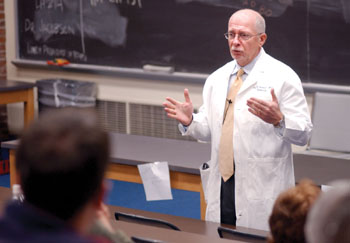
Dr. Harry Jacobson stressed evidence-based medicine as an important part of understanding the patient to the medical students gathered at the lecture this week. (photo by Anne Rayner Pollo)
Jacobson encourages medical students to know their patients
Variability in the practice of medicine wastes hundreds of billions of health care dollars every year, and contributes to the significant differences in the health care services received by black and white Americans, says Dr. Harry Jacobson, vice chancellor for Health Affairs.
“There’s a tremendous amount of overuse and misuse of resources,” Jacobson said Tuesday during a lecture to Vanderbilt medical students. “Half of the prescriptions that the average Medicare beneficiary takes are unnecessary.
“If you are a 35-year-old woman with rheumatoid arthritis … (and) see a general practitioner in Shelbyville, Tennessee, a rheumatologist at Vanderbilt, an internist in Birmingham, or you talk to your ob/gyn in Chicago, all four of them will give you different advice, all four of them will give different tests, all four of them will come up with a different way to treat you. That’s health care today.”
The biases of health care providers, coupled with lack of appreciation of the sociological and behavioral factors that impact health conditions like cancer, diabetes and heart disease also can contribute to the racial disparity in treatment and outcome, Jacobson added.
White patients on Medicare are twice as likely as their African-American counterparts to undergo angioplasty, for example. “Clearly there is not twice the incidence of coronary artery disease in whites,” he said. “There is no biological reason for that.”
Depending upon where they live, African-Americans may have less access to health care services. There may be cultural differences in the likelihood that patients will seek medical attention, or follow their doctors’ recommendations.
Some studies also have found that doctors are more likely to diagnose heart disease in men and white women with chest pain than in African-American women with the same symptom — indicating bias that is not supported by scientific evidence.
What’s needed is adherence to “evidence-based medicine,” the critical assessment of available research, consideration of sociological and behavioral factors as well as biological ones, and the attempt to determine which patients are most likely to benefit from a specific treatment or service, Jacobson said.
“We have both a moral and ethical challenge and responsibility to know what the social and behavioral factors are that might be responsible for disparities,” he told the students. “We also have the responsibility to find out and understand and use to our best advantage those biological issues that might be responsible for this.
“I don’t think we can address effectively disparities in health care until we accept … evidence-based medicine,” Jacobson added. Evidence-based medicine also is crucial for reducing the overuse and misuse of health care resources, which consumes $350 billion of the nation’s $1.4 trillion annual health care budget, he said.
“If health care doesn’t move in that direction, … where you should not be doing anything to a patient that you don’t have good information telling you it’s the right thing, we’re never going to solve this problem,” Jacobson said.
About 200 people attended the lecture, titled “Race, Disparity and Genomics – Sociology Meets Medicine,” which was held in Light Hall and sponsored by the Medical Student Section of the American Medical Association.
Students expressed skepticism that in today’s litigious environment, doctors would be willing to give up extra tests they now order. They also worried that the “art of medicine” could be lost.
Jacobson responded that the legal and credentialing systems should be relying on evidence-based medicine to determine the quality of a physician’s practice. “The right information available to the caregiver and the patient is going to give you the best outcome,” he said.
As for the art of medicine, “the art is the understanding of your patient and what makes them tick, what’s their family situation, how much time you need to spend to educate them about what they need to do to get optimal results,” Jacobson said.
“The art of medicine is the art of humanity,” he said. “Everything else is science.”













